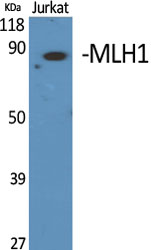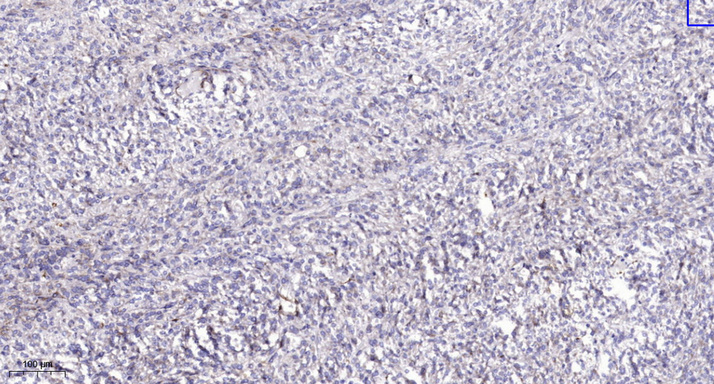MLH1 Polyclonal Antibody
- Catalog No.:YT2780
- Applications:WB;IHC
- Reactivity:Human;Mouse;Rat
- Target:
- MLH1
- Fields:
- >>Platinum drug resistance;>>Mismatch repair;>>Fanconi anemia pathway;>>Pathways in cancer;>>Colorectal cancer;>>Endometrial cancer;>>Gastric cancer
- Gene Name:
- MLH1
- Protein Name:
- DNA mismatch repair protein Mlh1
- Human Gene Id:
- 4292
- Human Swiss Prot No:
- P40692
- Mouse Gene Id:
- 17350
- Mouse Swiss Prot No:
- Q9JK91
- Rat Gene Id:
- 81685
- Rat Swiss Prot No:
- P97679
- Immunogen:
- The antiserum was produced against synthesized peptide derived from human MLH1. AA range:441-490
- Specificity:
- MLH1 Polyclonal Antibody detects endogenous levels of MLH1 protein.
- Formulation:
- Liquid in PBS containing 50% glycerol, 0.5% BSA and 0.02% sodium azide.
- Source:
- Polyclonal, Rabbit,IgG
- Dilution:
- WB 1:500-2000;IHC 1:50-300
- Purification:
- The antibody was affinity-purified from rabbit antiserum by affinity-chromatography using epitope-specific immunogen.
- Concentration:
- 1 mg/ml
- Storage Stability:
- -15°C to -25°C/1 year(Do not lower than -25°C)
- Other Name:
- MLH1;COCA2;DNA mismatch repair protein Mlh1;MutL protein homolog 1
- Observed Band(KD):
- 85kD
- Background:
- This gene was identified as a locus frequently mutated in hereditary nonpolyposis colon cancer (HNPCC). It is a human homolog of the E. coli DNA mismatch repair gene mutL, consistent with the characteristic alterations in microsatellite sequences (RER+phenotype) found in HNPCC. Alternative splicing results in multiple transcript variants encoding distinct isoforms. Additional transcript variants have been described, but their full-length natures have not been determined.[provided by RefSeq, Nov 2009],
- Function:
- disease:Defects in MLH1 are a cause of Muir-Torre syndrome (MTS) [MIM:158320]. MTS is a rare autosomal dominant disorder characterized by sebaceous neoplasms and visceral malignancy.,disease:Defects in MLH1 are a cause of susceptibility to endometrial cancer [MIM:608089].,disease:Defects in MLH1 are a cause of Turcot syndrome [MIM:276300]; also called mismatch repair cancer syndrome (MMRCS). Turcot syndrome is an autosomal dominant disorder characterized by malignant tumors of the brain associated with multiple colorectal adenomas. Skin features include sebaceous cysts, hyperpigmented and cafe au lait spots.,disease:Defects in MLH1 are the cause of hereditary non-polyposis colorectal cancer type 2 (HNPCC2) [MIM:609310]. Mutations in more than one gene locus can be involved alone or in combination in the production of the HNPCC phenotype (also called Lynch syndrome). Most families with cl
- Subcellular Location:
- Nucleus . Chromosome . Recruited to chromatin in a MCM9-dependent manner. .
- Expression:
- Colon, lymphocytes, breast, lung, spleen, testis, prostate, thyroid, gall bladder and heart.
- June 19-2018
- WESTERN IMMUNOBLOTTING PROTOCOL
- June 19-2018
- IMMUNOHISTOCHEMISTRY-PARAFFIN PROTOCOL
- June 19-2018
- IMMUNOFLUORESCENCE PROTOCOL
- September 08-2020
- FLOW-CYTOMEYRT-PROTOCOL
- May 20-2022
- Cell-Based ELISA│解您多样本WB检测之困扰
- July 13-2018
- CELL-BASED-ELISA-PROTOCOL-FOR-ACETYL-PROTEIN
- July 13-2018
- CELL-BASED-ELISA-PROTOCOL-FOR-PHOSPHO-PROTEIN
- July 13-2018
- Antibody-FAQs
- Products Images

- Western Blot analysis of various cells using MLH1 Polyclonal Antibody cells nucleus extracted by Minute TM Cytoplasmic and Nuclear Fractionation kit (SC-003,Inventbiotech,MN,USA).
.jpg)
- Western Blot analysis of Jurkat cells using MLH1 Polyclonal Antibody cells nucleus extracted by Minute TM Cytoplasmic and Nuclear Fractionation kit (SC-003,Inventbiotech,MN,USA).

- Western blot analysis of lysates from K562 cells, using MLH1 Antibody. The lane on the right is blocked with the synthesized peptide.

- Immunohistochemical analysis of paraffin-embedded human Colon cancer. 1, Antibody was diluted at 1:200(4° overnight). 2, Tris-EDTA,pH9.0 was used for antigen retrieval. 3,Secondary antibody was diluted at 1:200(room temperature, 45min).



